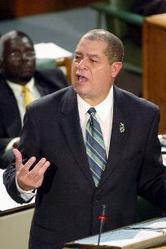
Audley Shaw, Spokesman on Finance for the Opposition Jamaica Labour Party. - File Keith Collister, Business Writer
Opposition spokesman on Finance, Audley Shaw, last week questioned Government's priorities, saying critically that some $9 billion was spent for a few days of World Cup Cricket when sectors like health need a resource boost.
Hundreds of people are dying of kidney disease, he charged, because they cannot afford dialysis treatment.
As he made his contribution to the Budget Debate, Shaw noted that the presentations were an opportune time to move "beyond talk and empty speeches to examine the real priorities" of Government.
While every politician claims to "love the poor," he said, the current budget demonstrates otherwise - 54 cents will go debt servicing, 23 cents to pay government workers, leaving 23 cents for everything else.
"And of that remaining 23 cents, a good chunk has in fact already been spent, and is only now in the budget because the bill has to be paid," said the Opposition Spokesman.
Noting that last year's 2.5 per cent growth was the best Finance Minister Dr. Omar Davies had seen in his entire 14-year tenure, Shaw said Jamaica had averaged a dismal annual growth rate of less than one per cent (0.8 per cent) per year over the period.
Last year's growth, he said, was less than half the level of Latin America and the world economy, and with the exception of Guyana, grew at a slower rate than every other Caribbean nation. Even Haiti, he added, matched Jamaica's rate of growth.
Shaw noted that in 1970, Barbados's per capita GDP of US$800 and Singapore's US$914 were only slightly above Jamaica's US$752.
But: "By 2005 - 35 years later - our per capita GDP is a mere US$3,657, while Barbados has leaped to over US$11,088 and Singapore has skyrocketed to over US$26,836," Shaw said as he addressed Parliament.
In real terms, GDP per capita of the average Jamaican was roughly the same as it was in 1971, which he described as "marching but going nowhere."
The official figures that nine out of every 10 people are employed don't reflect reality, he added, saying over "400,000 Jamaicans of productive working age do not have jobs and a large percentage of the 425,000 persons listed as self-employed are involved mostly in low productive, hand-to-mouth existence and are barely able to put food on the table and take adequate care of their children."
Lack of growth
In his view, this lack of growth and consequent earning power was driving the rate of repossession and auction by the National Housing Trust, which he said had jumped from 8.0 per cent three years ago to almost 17 per cent last year.
Arguing the debt will reach nearly one trillion dollars by the end of the new fiscal year, a level which was "dangerously unstable with 50 per cent of the debt linked to foreign currency and almost 50 per cent due to be paid in the next five years," making Jamaica "totally dependent on short-term trends in the capital markets just to meet our basic needs as a nation."
Shaw outlined what he called a real economic development plan for Jamaica, to deliver six-10 per cent growth over the medium to long-term, measures that include what he described as a credible debt management strategy, energy policy, a more efficient government bureaucracy, tax reform and investment promotion.
Noting that the debt was the primary constraint on Jamaica's economic growth and development, he outlined a seven-point plan for: constitutional limits on borrowing, borrowing cheap financing from the multilaterals, a comprehensive audit to eliminate loss making entities, using PetroCaribe funds to pay down debt instead of "filling holes in the budget", partnering with the private sector to reduce interest rates, securitising foreign exchange proceeds to reduce interest costs, and exploring the issue of diaspora bonds.
Shaw said that before taxes were increased, all reasonable steps mustbe taken to eliminate waste and improve efficiency in the public service to create an efficient government bureaucracy.
This should start with a comprehensive and transparent audit of the central government, government agencies, statutory bodies and public sector companies to identify areas where waste can be eliminated, efficiency increased and service delivery improved.
Finally, in the area of tax reform - he argued the need to reduce corporate income taxes in line with personal income taxes, and over time further reduce corporate and personal income taxes.
Innovative savings instruments should also be developed, including special tax credits to encourage first-time home ownership, the Opposition Spokesman said.
keithcollister@cwjamaica.com

